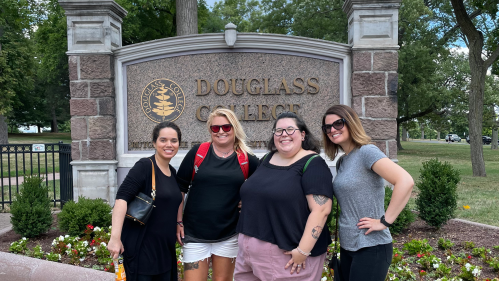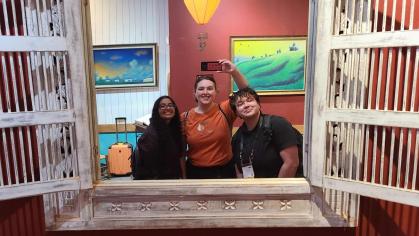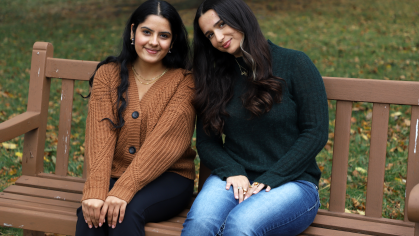Nontraditional Students Week at Douglass

At Douglass, diversity, equity, and inclusion is expansive, offering a wide array of initiatives to serve students from a multitude of unique experiences—including those who have had to take alternative paths to the typical college experience. During the month of November, the College is celebrating its thriving population of nontraditional students—students over the age of 23 pursuing a college education—and raising awareness for the challenges they face.
“Part of being a diverse and inclusive university is accepting and accommodating those from different backgrounds than the traditional demographic of students on campus,” said Gail Lordi DRC’24, a nontraditional aged Douglass student studying ITI and women’s, gender, and sexuality studies.
Douglass’ nontraditional student community includes a diverse range of stories and voices. Some students are parents, others are caretakers for elderly family members, and many work full or part-time jobs in addition to completing their coursework. Douglass’ Sophia I. Bunting Program (the Bunting Program) meets the needs of the College’s nontraditional student community with extra advising resources, special spaces and social opportunities on campus, and a designated living-learning community for those that need year-round on-campus housing. The Bunting Program seeks to ensure nontraditional students have access to necessary, unique services—from priority course scheduling to ensure classes don’t conflict with work or family obligations to a private lactation space for those who need to breast feed children.
Douglass students and staff seek to fill the gaps where there is a lack of attention and support. Gail Lordi and Jesenia Delgado DRC’24 are working alongside Douglass staff as student liaisons to bring awareness to the specific needs of nontraditional aged students to the larger university community.
“Some of the circumstances a nontraditional aged student might face is balancing a full-time job and attending school full time, while fulfilling other obligations,” said Delgado “There’s also the possibility of not qualifying for financial aid or scholarships based on an income that doesn’t accurately demonstrate the situation or need.”
“In my experience, many of my nontraditional classmates struggle with the demands of being on campus multiple days a week while balancing the demands of their personal and family lives,” said Lordi. “Many of my peers have no time for themselves after completing their coursework.”
Through their work with Douglass, Lordi and Delgado are brainstorming innovative solutions to these obstacles, particularly through modern technology.
“One thing that would make a wild difference in the lives of many nontraditional students, as well as those affected by other circumstances, would be to allow courses to be available online despite campus opening up after COVID,” Lordi said. “The only way I could balance my professional aspirations with the demands of having to work for a living was to have asynchronous classes as an option.”
Advocacy on behalf of nontraditional aged students is critical, as many feel their experiences are under-represented in higher education. By shedding light on these issues, Lordi and Delgado hope to foster better visibility on campus.
“Bringing awareness and developing programs for adult students would attract more nontraditional students to enroll in school,” said Delgado. “Going back to school to get a degree could improve many lives. It could mean getting a promotion, a pay raise, or employment for those who are unemployed. More income means more support for themselves and their families.”
As nontraditional students themselves, both Lordi and Delgado draw from their own experiences to help advocate for their peers.
“My own experience as a nontraditional student has been a roller coaster,” Lordi said. “Working through the pandemic as a frontline responder, taking classes, planning my second career, and getting married within one semester is just the beginning of my nontraditional journey. I can't wait to see where it takes me next.”
“The larger university should know that nontraditional aged students are held to the same standard as traditional students,” said Delgado. “Despite their many challenges, they rise to the occasion and get their work done. They are dedicated, hardworking, and serious about achieving their goals, and should be recognized for it.”


